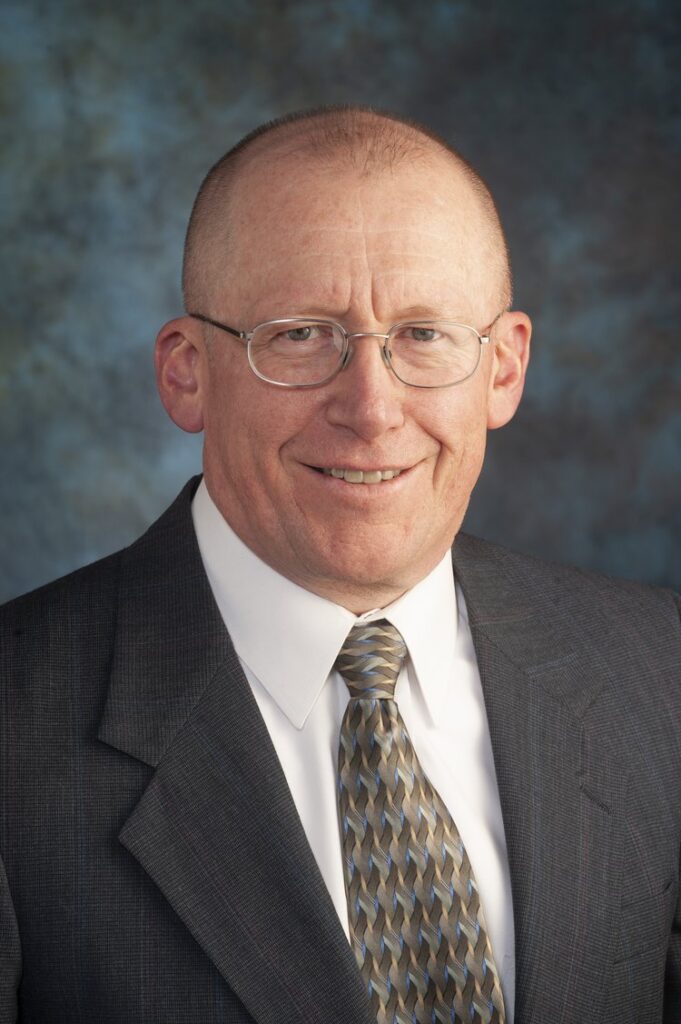Head of WYDOT Shares Insights on Gas Prices, Transportation Challenges and Projects in the Works
Some challenges include I-80 maintenance and budgetary constraints
- Published In: Other News & Features
- Last Updated: Jul 29, 2022

By Shen Wu Tan
Special to the Wyoming Truth
A new gas and diesel price working group is brainstorming ways to provide relief to Wyomingites from higher prices at the pump, whether that’s introducing a tax rebate program or ramping up import capacity of energy supply. One of the members is Luke Reiner, the director of the Wyoming Department of Transportation (WYDOT).
Reiner, 59, who resides in Cheyenne, was appointed by Gov. Mark Gordon as the 18th director of the transportation department in 2019. He oversees nearly 2,000 full-time employees in 60 locations across the state, about 7,000 miles of highway and around 2,000 bridges. Reiner is also responsible for the Wyoming Highway Patrol, Driver’s Services and statewide emergency communications and aeronautic operations.

Prior to joining WYDOT, Reiner spent 36 years with the military and retired as the Adjutant General for Wyoming. He earned bachelor’s degrees in business and education from Concordia University, a master’s degree in public administration from the University of Wyoming and a master’s degree in national security strategies from the U.S. Army War College.
The Wyoming Truth sat down with Reiner to discuss the gas and diesel price working group, transportation issues in the state and projects currently in the works.
What led you to join WYDOT?
Reiner: …It’s been a great way to continue to serve. There was a steep learning curve for the first little bit, but I’ll tell you, there [are] 2,000 great men and women with a focus on a mission, all working hard to maintain the transportation system in our state.
One of the things that you figure out in the military is that…lines of communication are key and critical to accomplishing your mission because everything travels typically on a transportation system, whether it’s a road or some type of aircraft or some other means. So one, I’m not an engineer by trade, but what I do know is that it is key to maintain your roads. When the snow flies, you’ve got to plow it. When they’re broke or there are potholes, you’ve got to fix it. They need to be safe.
As a member of the gas and fuel price working group, what are your thoughts on potential solutions to higher gas prices in Wyoming?
Reiner: As we sat through two public meetings, what I think jumped to the forefront in my mind was that this certainly is a supply issue. And the fact that there is drilling that could occur that’s not, the fact that we haven’t had a new refinery for 50 years and today we have three refineries…and not so long before that we had 12. So in my mind, you’re dealing with a commodity that has a global supply and demand. And right now, you get into the state of Wyoming, and supply is tough. And so that really became the focus of the discussion was, “Is there anything we can do to enhance supply?”
Is it likely the group will consider a fuel tax holiday? If so, how would it impact the state and your department?
Reiner: I think that’s a policy decision that may or may not be made. In terms of effect, I think maybe what you saw was the public talking point that said, “Hey, listen, if you take a holiday, it’s about $10 million a month in terms of the money that’s collected.”
…WYDOT runs a balanced budget. Part of our requirement is you have to program to spend the revenue that you get…There’s projects we’ve already put on the backburner because we didn’t have enough revenue. And so, if you start not collecting the revenue, the money will have to come from somewhere, and before long you get into the business of deciding what you’re not going to do.
What are some transportation issues in the state you would like to highlight and that your department is currently working to address?
Reiner: I think when you talk about challenges specifically on the road system I-80 is the first one that jumps to mind, and that one is 403 miles , , , and its average height in terms of elevation is about 6,000 feet…When you have an average elevation about 6,000 feet across those 400 some miles, it’s like a big mountain pass. And when you look at the weather patterns, we probably don’t necessarily get the most snow of any place along that road, but if you look at a wind map, we probably are almost the worst place in the nation in terms of wind on stretches of that road. And so, we are continually dealing with keeping that road open. . . . It’s important for us to keep it open in terms of our nation’s economy, because there’s a lot of equipment and a lot of material that moves on that road.
What are we doing to address it? One is making sure our equipment is up-to-date on that road. …We actually did make a recommendation here a little bit ago that it might make sense for us to have what we’d call a winter-free detour off of I-80…
…The other thing we have going on on I-80 is actually looking at the intersection of our two major interstates. So you’ve got I-80 that runs east to west on the south side, and then you’ve got I-25 that’s a major north-south route…and there’s the original intersection that was built and the turns are pretty tight and trucks keep falling over and we’ve got to keep it maintained. So really, we would like to build a new one or we’d like to replace that intersection with a new one.
The other challenge is fiscal resources. We are budgetarily constrained at this point, not really on the federal side but on the state. And so, we work within those constraints and do absolutely the best job that we can. And so, there are projects we have delayed, not because they are not important, but because we just don’t have the budget to do them.
The other challenge that we would have, and I think you find this in many places across our nation today, is just the ability to find employees. WYDOT is hiring…We could probably hire 250 or 300 [workers] in all walks…
Any major transportation projects underway?
Reiner: We’re doing a really nice project up [in Casper] replacing a bridge up on the interstate. It’s a fairly big project in terms of length, and it’s on time and on budget …We have our largest project that Wyoming has ever led south of Jackson… It’s very mountainous up there and very unstable in terms of geographical, geological issues. And so that one is about three miles and lots of drill chafes and making sure that the road is stable…
We started a project this year that we call the dry pining project…It’s about 18 miles worth of road [in Sublette County]. And on that 18 miles, we’re putting in nine underpasses for wildlife in concert with a wildlife fence along that entire stretch that will guide the wildlife to those underpasses…Wyoming loves its wildlife. And so when we have a project that can really try and stop people from hitting deer, antelope and elk, it’s a really good thing. That project happens to be in one of the world’s largest migration routes for mule deer. And so we know we’re saving statistically lots of lives of mule deer and an awful lot of damage to cars, too.
Have deaths and crashes along I-80 increased over the years or do they tend to fluctuate?
Reiner: It certainly fluctuates. . . . one fatality is too many. And this year, our fatality rate is right about where it has been the past two…We keep working and focusing on safety on many fronts.
This year, in terms of fatalities, at the end of June we had 50 fatalities. And in 2021, we had a total of 111 fatalities. In 2020, we had a total of 128.
…As we talk about highway safety, one of the things we always ask people is to slow down, buckle up and please take your eyes off the phone and avoid driving distracted because so many of the accidents are single vehicle rollovers, which you never quite know what happened but we always suspect distracted driving because people will drift off the road…
Any projects related to I-80 in Wyoming that the department is tackling?
Reiner: One is truck parking. We have two truck park trucking areas under construction right now, and we’ve actually started the study for a third. The third one is close to Evanston on the west side of the state, but the first two is part of what we call the winter freight project. And so that added truck parking and it also added some climbing lanes for the trucks just because some of those hills are pretty big and an extra lane is helpful for the slow-moving trucks…Supporting trucks is very key to us. Freight is important to us and we really want to be in the business of making sure that if you’re a trucker that we’ve got a good place for you to park and pull over.













